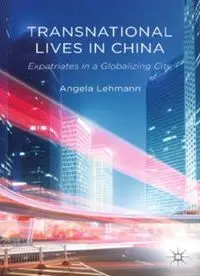Table Of ContentTransnational Lives in China
This page intentionally left blank
Transnational Lives
in China
Expatriates in a Globalizing City
Angela Lehmann
Xiamen University
© Angela Lehmann 2014
Softcover reprint of the hardcover 1st edition 2014 978-0-230-34839-4
All rights reserved. No reproduction, copy or transmission of this
publication may be made without written permission.
No portion of this publication may be reproduced, copied or transmitted
save with written permission or in accordance with the provisions of the
Copyright, Designs and Patents Act 1988, or under the terms of any licence
permitting limited copying issued by the Copyright Licensing Agency,
Saffron House, 6–10 Kirby Street, London EC1N 8TS.
Any person who does any unauthorized act in relation to this publication
may be liable to criminal prosecution and civil claims for damages.
The author has asserted her right to be identified as the author of this work
in accordance with the Copyright, Designs and Patents Act 1988.
First published 2014 by
PALGRAVE MACMILLAN
Palgrave Macmillan in the UK is an imprint of Macmillan Publishers Limited,
registered in England, company number 785998, of Houndmills, Basingstoke,
Hampshire RG21 6XS.
Palgrave Macmillan in the US is a division of St Martin’s Press LLC,
175 Fifth Avenue, New York, NY 10010.
Palgrave Macmillan is the global academic imprint of the above companies
and has companies and representatives throughout the world.
Palgrave® and Macmillan® are registered trademarks in the United States,
the United Kingdom, Europe and other countries.
ISBN 978-1-349-34559-5 ISBN 978-1-137-31915-9 (eBook)
DOI 10.1057/9781137319159
This book is printed on paper suitable for recycling and made from fully
managed and sustained forest sources. Logging, pulping and manufacturing
processes are expected to conform to the environmental regulations of the
country of origin.
A catalogue record for this book is available from the British Library.
A catalog record for this book is available from the Library of Congress.
Dedicated to the memory of
Felicity Lehmann
Anthropologist, writer and traveller
1948–2011
This page intentionally left blank
Contents
Acknowledgements viii
1 Introduction 1
Part I Vulnerabilities of Global Mobility
2 Anxiety and Individualism 17
3 Ecstasy and Freedom 44
4 Fear and Difference 64
Part II Power and Community
5 Division 85
6 Gender and Race 111
7 Home 134
8 Conclusion 153
Notes 158
References 159
Index 168
vii
Acknowledgements
This research was made possible by the College of Arts and Social Sci-
ences (CASS), Australian National University, Australia. A huge debt
of gratitude is extended particularly to Dr Alastair Greig at CASS. His
numerous readings and re-readings and the generosity of time spent
with drafts of this work is the only reason this research has seen the
light of day.
Peter and Jane Lehmann were a constant sounding board for my ideas
and have put up with my endless questioning about their own times
in China. Without them, this research would have been a much more
arduous process. I am incredibly fortunate to have had the support and
patience of my father during the research and writing process.
Many thanks to the people of Xiamen. To those who were interviewed
for this research and those who put up with having a sociologist in their
midst – especially while they were trying to have a good time – thank
you. I am grateful to everyone in Xiamen who helped and supported me
with this project. I would especially like to thank Li Weilin for her help
and friendship.
Thanks also to the anonymous reviewers of this manuscript whose
helpful comments have doubtless improved this work. Of course, all
errors and faults lie solely with me.
Finally, thank you to Wayne Jones with whom I first ‘met’ Xiamen
and who, throughout it all, remains my best friend, my muse and my
happiness.
viii
1
Introduction
The great escape
Research on migration from the West has expanded rapidly in recent
years. The emergence of a burgeoning research discipline reflects an
increased number of people from developed countries living and work-
ing between national boundaries and the anticipated effect this may
have on both sending and receiving nations. It also reflects an increased
interest in the social sciences in the everyday lives of those of a
‘middling’ level of transnational experience (Smith 2001). In other
words, those who fit neither in the upper echelons of the transnational
elite moving between highly paid jobs in major international cen-
tres nor in the unskilled or forced migrant group that represents the
underprivileged and often disempowered face of globalization.
This growing group of migrants are middle class, relatively privileged
and relatively well-educated people and have, until recently, been some-
what ignored from a grassroots, ethnographic perspective (Beaverstock
2002; Willis and Yeoh 2002). It is these transnational workers who will
have an increasing impact on the way the world is shaped and the way
that perceptions of cultural and social difference are interpreted and
recreated on a daily basis. It is possible, indeed likely, that the middle
classes from Europe, Australia and North America will have more and
more experience as transnational workers living within Asia, particu-
larly within China. Further, it is likely that rather than the traditional
financial hubs of Shanghai and Hong Kong, emerging cities may attract
increasing numbers of such migrants as new destinations within rapidly
growing economies come to challenge traditional destinations (Skeldon
2010: 12).
1

